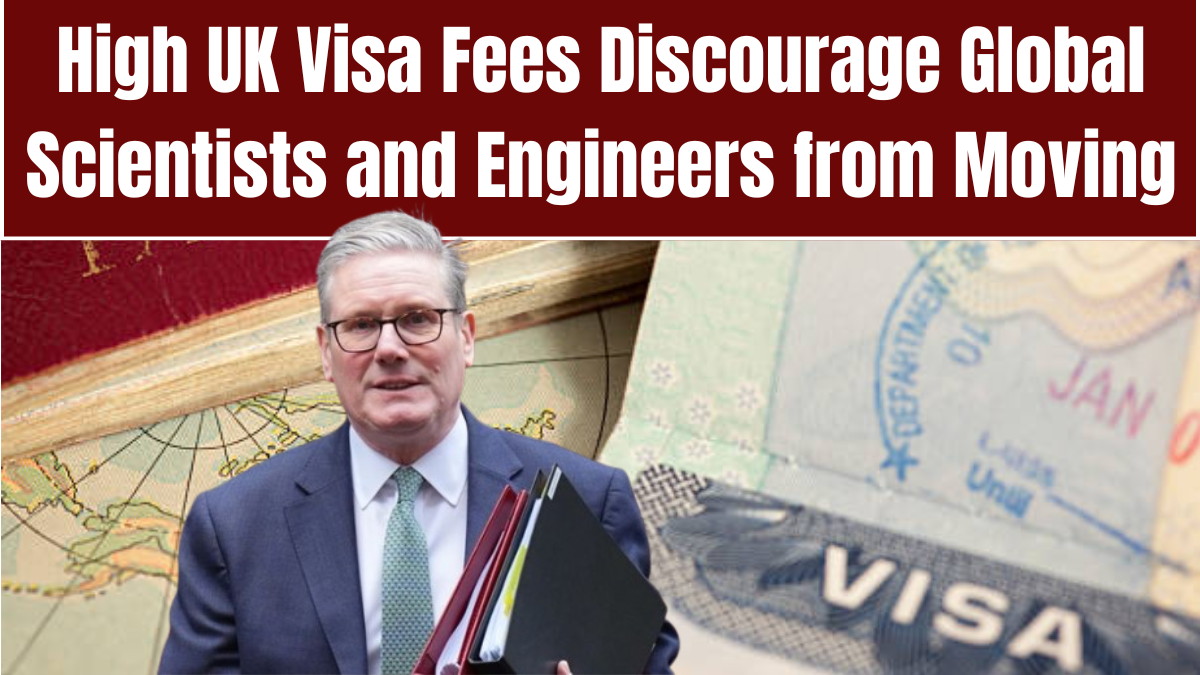In a time when the UK urgently needs talent in science and engineering, soaring visa fees are discouraging global experts from joining British institutions. As of April 2025, professionals in STEM (science, technology, engineering, and mathematics) fields are increasingly turning down UK job offers, citing overwhelming visa expenses.
Ed Roberts, a senior researcher at Cancer Research UK’s Scotland Institute, faced a year-long delay in filling a key research role—largely due to prohibitive visa charges. He believes these high upfront costs are actively slowing down research progress and making the UK less attractive to global talent.

UK’s Visa System: Among the Most Expensive in the World
The Royal Society highlights that UK immigration fees for skilled foreign workers are up to 17 times higher than other top science-driven nations. A significant portion of this cost stems from the Immigration Health Surcharge (IHS), which now sits at £1,035 annually per adult—a 66% rise since last year.
Visa expenses for a skilled worker and their family can easily exceed £15,000, making it difficult for foreign researchers to relocate. In one case, a scientist from Hong Kong turned down a job offer from Roberts’ lab due to the steep costs of moving his family to the UK.
While some employers reimburse employee visa fees, they rarely cover the additional costs for family members—leaving top talent hesitant or unable to accept opportunities.
Talent Drain Threatens UK’s Economic and Research Growth
The consequences go beyond missed hiring opportunities. Experts argue that these high visa costs threaten Britain’s efforts to attract talent from countries like the United States, where recent political developments have undermined federal research funding.
French scientist Baptiste Brauge, who accepted a role with Roberts, described the process of initially paying his £4,400 visa fee as “frightening,” despite being reimbursed later. It still required him to spend a large chunk of his personal savings upfront.
Government Reviews and Policy Contradictions
The current government under Prime Minister Keir Starmer is conducting a review of labour shortages in critical sectors like engineering and information technology. However, critics argue that the visa policy contradicts these goals by discouraging foreign workers through sky-high upfront costs and complex regulations.
The UK charges businesses around £12,120 for a standard five-year skilled worker visa. Adding a spouse and two children can bring the total to £30,000, according to immigration firm Fragomen.
Even Britain’s supposedly specialized Global Talent Visa, tailored for researchers and innovators, is more expensive than similar options in countries such as the U.S., China, Germany, and Japan.
Cancer Research UK estimates it spends £700,000 annually on visa-related costs—funds that could otherwise be directed toward life-saving research.
Visa Uptake Falls Amid Rising Barriers
New data from the Home Office shows a 33% drop in visas granted for science, engineering, and research jobs in the second half of 2024 compared to the same period the previous year. This decline reflects broader reductions in work visa approvals following increases to the IHS and the minimum salary threshold, which rose nearly 50% recently.
This sharp drop is concerning given that nearly half of the 934,000 UK job vacancies at the end of 2023 were in STEM-related roles, according to a University of Cambridge study.
Voices from Academia and Industry Warn of Long-Term Impact
Alison Noble, Foreign Secretary at the Royal Society, emphasized that high visa costs are turning away talent that might otherwise consider the UK—especially in light of U.S. policy changes under President Donald Trump.
Matt Clifford, AI adviser to Starmer’s administration, warned in an official government report that the “cost and complexity” of UK visas pose a serious threat to attracting startup and innovation-focused professionals.
Julia King, a former chair of the Science and Technology Committee in the House of Lords, went as far as to call the policy an “act of national self-harm.” She warned that without foreign expertise, the UK is undermining its future in knowledge-driven industries.
FAQs
Why are UK visa costs so high for scientists and engineers?
UK visa fees include charges like the Immigration Health Surcharge and application costs, which have increased significantly in recent years, making them among the highest globally.
How much does it cost for a foreign researcher to bring their family to the UK?
A researcher moving to the UK with a spouse and two children may face upfront costs exceeding £30,000 for a five-year visa.
Is the UK government taking action on this issue?
The UK government has launched a review into labour shortages but has yet to make specific adjustments to reduce visa fees for STEM professionals.
How is this impacting UK research institutions?
High visa costs are delaying recruitment, discouraging international talent, and forcing organizations like Cancer Research UK to divert funds away from research.
What are the long-term risks of high visa fees?
Experts warn that these policies could severely limit the UK’s ability to remain competitive in science and technology fields, reducing innovation and slowing economic growth.
Click here to know more.
Aanchal is a passionate writer with a keen interest in storytelling, content creation, and creative expression. She enjoys exploring diverse topics and crafting engaging narratives that captivate readers.

